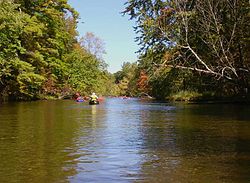This article includes a list of references, related reading, or external links, but its sources remain unclear because it lacks inline citations .(December 2025) |
This list of Michigan rivers includes all streams designated rivers although some may be smaller than those streams designated creeks, runs, brooks, swales, cuts, bayous, outlets, inlets, drains and ditches. These terms are all in use in Michigan. Other waterways are listed when they have articles.
Contents
- In alphabetical order
- A–C
- D–K
- L–M
- N–R
- S–Z
- By watershed
- Lake Erie basin
- Lake St. Clair basin
- Lake Huron basin
- Lake Michigan basin
- Lake Superior basin
- See also
- References
- External links
The state has over 300 named rivers. Several names are shared by different rivers; for example, there are eight Pine Rivers and seven Black Rivers. In four cases there are two rivers of the same name in one county. In these cases extra information such as alternate name or body of water they flow into has been added.








